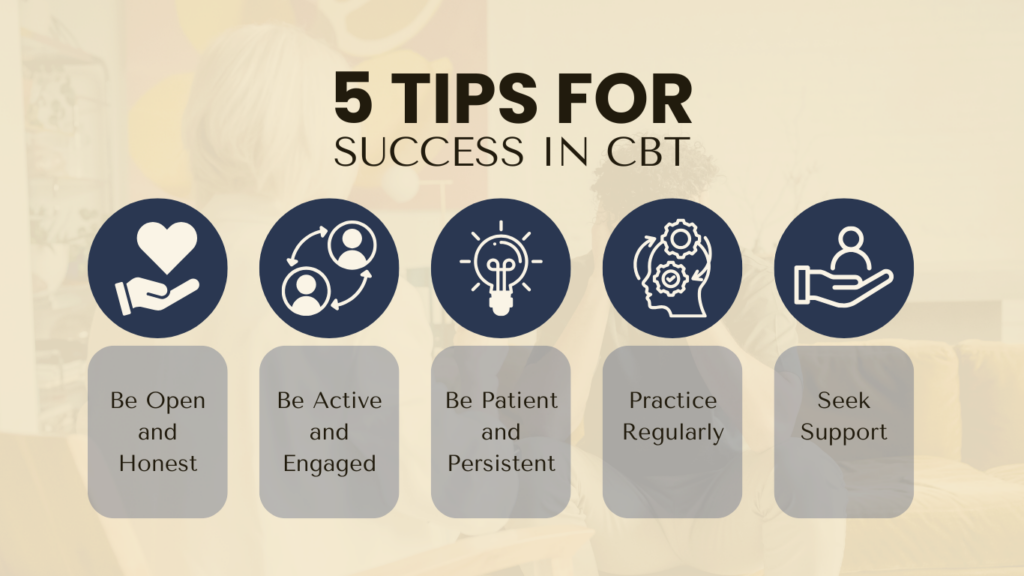Cognitive Behavioral Therapy – Atlanta, GA

Have you ever felt like your thoughts were stuck in a loop, constantly replaying negative scenarios or fueling anxiety? It’s a shared experience, and thankfully, there are effective ways to address it.
If you’re looking for a way to improve your mental health and overall well-being, MARR Treatment Centers’ Cognitive Behavioral Therapy (CBT) – Atlanta, GA, might be the answer. We use evidence-based treatment approaches such as CBT to help individuals like you regain control of their lives and thoughts.
What is Cognitive Behavioral Therapy (CBT)?
Cognitive Behavioral Therapy, or CBT, is a popular form of psychotherapy that focuses on the connection between your thoughts, feelings, and behaviors. It’s based on the idea that negative thought patterns can lead to emotional distress and problematic behaviors.
By identifying and changing these thinking patterns, CBT can help you develop healthier coping strategies and improve your quality of life.
The Core Principles of CBT
At its heart, CBT is about self-awareness and empowerment. Here are some key principles:
- Identifying Negative Thinking: Recognizing the negative thinking contributing to your emotional distress.
- Challenging Thoughts: Evaluating the accuracy and helpfulness of these thoughts.
- Changing Behaviors: Developing new behaviors that support your goals and improve your well-being.
How CBT Works
CBT is typically a short-term, focused therapy. You’ll work with a mental health professional, such as an LCSW, LPC, or PsyD, to explore your thinking patterns and behaviors in a structured way. You’ll identify specific goals and develop a treatment plan to achieve them.
During CBT therapy sessions, you might:
- Discuss specific situations or challenges you’re facing.
- Identify the thoughts and feelings associated with those situations.
- Examine the evidence for and against your negative thoughts.
- Learn techniques to challenge and change your thinking patterns.
- Practice new behaviors and coping skills in real-life situations.
Conditions CBT Can Help Treat
CBT is a versatile therapy that can be used to treat a wide range of mental health conditions. Here are some of the most common:
- Anxiety Disorders: CBT is highly effective in treating various anxiety disorders, including generalized anxiety disorder, social anxiety disorder, and panic disorder.
- Depression: By challenging negative thinking and promoting positive behaviors, CBT can help alleviate symptoms of depression.
- Obsessive-Compulsive Disorder (OCD): CBT, particularly Exposure and Response Prevention (ERP), is a first-line treatment for OCD.
- Phobias: CBT can help you overcome your fears by gradually exposing you to the feared object or situation while teaching you coping skills.
- Post-Traumatic Stress Disorder (PTSD): CBT can help you process traumatic memories and develop coping strategies to manage symptoms of PTSD.
- Substance Abuse: CBT can help individuals identify triggers for substance use, develop coping strategies to resist cravings, and prevent relapse.
- Bipolar Disorder: CBT can be used in conjunction with medication to help manage mood swings and improve overall functioning.
- Other Mental Health Disorders: CBT is also used to treat other mental health disorders, such as eating disorders, insomnia, and chronic pain.
CBT Techniques Used in Therapy
CBT involves various techniques to help you identify and change negative thinking patterns and behaviors. Here are some standard CBT techniques:
- Cognitive Restructuring: This technique involves identifying and challenging negative thoughts and replacing them with more realistic and balanced ones.
- Behavioral Activation: This involves increasing your engagement in activities that you enjoy and that give you a sense of accomplishment.
- Exposure Therapy: This technique involves gradually exposing yourself to feared objects or situations in a safe and controlled environment.
- Thought Records: Recording your thoughts, feelings, and behaviors can help you identify patterns and triggers.
- Role-Playing: Practicing new behaviors and coping skills in a safe and supportive environment can help you feel more confident in real-life situations.
- Mindfulness: Practicing mindfulness can help you become more aware of your thoughts and feelings in the present moment without judgment.

How CBT Differs from Other Therapies
Unlike other talk therapy forms, CBT is typically more structured and goal-oriented. It focuses on specific problems and teaches you practical skills to manage them. While it may explore past experiences, the primary focus is on the present and future.
Benefits of Cognitive Behavioral Therapy
There are numerous benefits to engaging in Cognitive Behavioral Therapy, including:
- Improved Mental Health: CBT can help reduce symptoms of anxiety, depression, and other mental health conditions.
- Better Coping Skills: CBT teaches you effective coping strategies to manage stress, emotions, and challenging situations.
- Increased Self-Esteem: By challenging negative thoughts and promoting positive behaviors, CBT can help improve your self-esteem.
- Enhanced Relationships: CBT can help you communicate more effectively and resolve conflicts in your relationships.
- Greater Overall Well-Being: CBT can enhance overall well-being and quality of life by improving mental health and coping skills.
CBT and Co-Occurring Disorders
CBT is often used in conjunction with other treatment approaches to address co-occurring disorders, such as substance abuse and mental health conditions. By addressing both issues simultaneously, individuals can achieve more comprehensive and lasting recovery.
CBT Techniques Modified for Co-Occurring Disorders
When treating co-occurring disorders, CBT practitioners employ specialized adaptations:
- Integrated Relapse Prevention: Techniques that address both substance cravings and mental health symptom management
- Functional Analysis: Examining the antecedents and consequences of both substance use and mental health symptoms
- Cognitive Restructuring: Challenging distorted thinking patterns that maintain both disorders
- Skills Training: Developing healthy coping mechanisms for managing cravings, emotional regulation, and stress reduction
- Behavioral Activation: Engaging in rewarding activities that support recovery from both conditions
Finding a CBT Therapist in Atlanta
If you’re interested in trying CBT in Atlanta, finding a qualified and experienced mental health professional is essential.
Here are some tips:
- Ask for Referrals: Talk to your doctor, friends, or family members for referrals to therapists in your area.
- Verify Credentials: Make sure the therapist is licensed and has experience treating your condition.
- Schedule a Consultation: Meet with the therapist for a consultation to see if you feel comfortable working with them.
Questions to Ask a Potential Therapist
When you’re interviewing potential therapists, here are some questions to ask:
- What is your experience with CBT?
- What conditions do you specialize in treating?
- What is your approach to therapy?
- What are your fees and payment options?

Why Choose MARR?
At MARR Treatment Centers, we understand that everyone’s journey to recovery is unique. That’s why we offer a range of programs and treatment approaches tailored to meet your unique needs.
Our team of experienced professionals is dedicated to providing the highest quality of care in a supportive environment.
Our Programs and CBT
We incorporate CBT into several of our programs, including:
- Men’s Recovery Center: Our men’s program addresses substance use and co-occurring mental health conditions through individual and group therapy, including CBT.
- Women’s Recovery Center: Our women’s program provides a safe and supportive environment for women to heal from addiction and trauma, using CBT to address underlying issues.
- Extended Care: Our extended care program offers ongoing support and therapy, including CBT, to help individuals recover and build a fulfilling life.
How We Use CBT Specifically
In our programs, CBT is used to:
- Identify and challenge negative thinking patterns that contribute to addiction and mental health issues.
- Develop coping strategies to manage cravings, triggers, and stress.
- Improve communication and relationship skills.
- Increase self-esteem and confidence.
- Prevent relapse and promote long-term recovery.
Other Modalities Used at MARR
In addition to CBT, we also utilize other evidence-based modalities, such as:
- Dialectical Behavior Therapy (DBT): DBT is particularly helpful for individuals who struggle with emotional regulation and impulsivity.
- Family Therapy: Family therapy can help improve communication and resolve conflicts within the family system.
- Group Therapy: Group therapy provides a supportive environment for individuals to share their experiences and learn from others.
- Mindfulness: Mindfulness practices can help individuals become more aware of their thoughts and feelings in the present moment.
Overcoming Challenges in Therapy
Like any form of therapy, CBT can present challenges. It’s essential to be patient and communicate openly with your therapist about any difficulties you’re experiencing. Some common challenges include:
- Resistance to Change: Changing long-standing thinking patterns and behaviors can be complex.
- Emotional Discomfort: Confronting negative thoughts and feelings can be emotionally challenging.
- Lack of Motivation: It can be hard to stay motivated to attend therapy sessions and complete homework assignments.

Tips for Success in CBT
Here are some tips to help you succeed in CBT:
- Be Open and Honest: Be willing to share your thoughts, feelings, and experiences with your therapist.
- Be Active and Engaged: Participate actively in therapy sessions and complete homework assignments.
- Be Patient and Persistent: Changing your thinking patterns and behaviors takes time and effort.
- Practice Regularly: Practice the skills you learn in therapy daily.
- Seek Support: Lean on your support system of friends, family, or support groups.
The Role of Mindfulness in CBT
Mindfulness is increasingly integrated into CBT to enhance self-awareness and reduce emotional reactivity. By practicing mindfulness, you can learn to observe your thoughts and feelings without judgment, which can help you break free from negative thinking patterns.
How Mindfulness Enhances CBT
Mindfulness can enhance CBT by:
- Increasing Self-Awareness: Mindfulness helps you become more aware of your thoughts, feelings, and bodily sensations.
- Reducing Emotional Reactivity: Mindfulness can help you respond to emotions more balanced and less reactively.
- Promoting Acceptance: Mindfulness can help you accept your thoughts and feelings without judgment.
- Improving Focus: Mindfulness can help you improve your focus and concentration.
Taking the First Step
If you’re struggling with anxiety, depression, or other mental health conditions, CBT may be the answer you’ve been looking for. Contact MARR Treatment Centers today to learn more about our programs and how we can help you regain control of your life. Remember, seeking help is a sign of strength, and with the proper support, you can achieve lasting recovery and improved well-being.
A Note to a Loved One
If you have a loved one struggling with addiction or mental health issues, encouraging them to seek help can be one of the most important things you can do. Offer your support, listen without judgment, and help them find the resources they need to get well. Together, you can navigate the challenges and build a brighter future.
By understanding CBT and its applications, you are now more informed about how it can be a powerful tool for improving mental health and overall well-being. If you’re in Atlanta, GA, remember that MARR Treatment Centers is here to provide evidence-based care and support on your journey to recovery.
Call us today at (678) 805-5100 to learn more.
